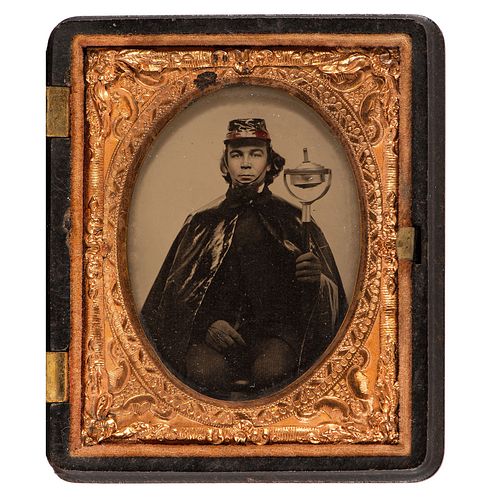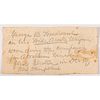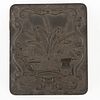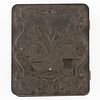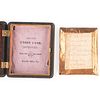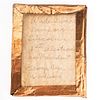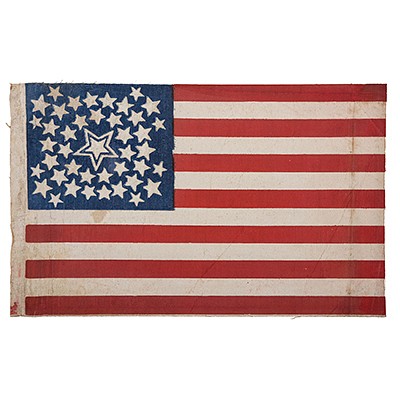Ninth Plate Ambrotype of Lincoln Wide Awake George B. Woodward
About Seller
6270 Este Ave.
Cincinnati , OH 45232
United States
With offices in Cincinnati, Cleveland and Denver, Cowan’s holds over 40 auctions each year, with annual sales exceeding $16M. We reach buyers around the globe, and take pride in our reputation for integrity, customer service and great results. A full-service house, Cowan’s Auctions specializes in Am...Read more
Two ways to bid:
- Leave a max absentee bid and the platform will bid on your behalf up to your maximum bid during the live auction.
- Bid live during the auction and your bids will be submitted real-time to the auctioneer.
Bid Increments
| Price | Bid Increment |
|---|---|
| $0 | $25 |
| $500 | $50 |
| $1,000 | $100 |
| $2,000 | $250 |
| $5,000 | $500 |
| $10,000 | $1,000 |
| $20,000 | $2,500 |
| $50,000 | $5,000 |
| $100,000 | $10,000 |
About Auction
Nov 19, 2020
Cowan’s Auctions, a Hindman Company, is pleased to present the November 19 Fall Auction, featuring over 400 lots of historically significant photography, manuscript material, artwork, and other ephemera dating from the 18th through the early 20th century, including the Civil War. Cowan's Auctions dawnie@cowans.com
- Lot Description
Ninth plate ambrotype identified as George Beza Woodward (1837-1927) of Derry, New Hampshire, a Wide Awake campaigner during Lincoln's first presidential campaign. N.p., n.d., ca 1860. Housed in "Harvest Motif" thermoplastic case [Berg 1-146], by Scovill (interior label). Identified on verso of image: "Wide Awake Campaign Lincoln's 1st election as President George Beza Woodward." Accompanying pencil inscription on paper reads: "George B. Woodward in his Wide Awake Uniform worn during the campaign for Abraham Lincolns first Election in Derry, New Hampshire."Woodward is pictured wearing his Wide Awake uniform with a military-style hat tinted red and an oil-cloth cape, its characteristic shininess captured by the photographer. With one hand he holds a whale oil torch used in their parades.The paramilitary organization for young Republican men began organically during the hotly-contested Connecticut gubernatorial election of 1858, which many saw as a preview for the upcoming presidential election. Young men began to escort Republican speakers through the Hartford streets with flaming torches. Republican William Alfred Buckingham narrowly won and many credited the Wide Awakes as a crucial deciding factor. In 1860, Lincoln gave a speech in Hartford and earned the support of the group who responded to his opposition to slavery and support of workers' rights to strike. Quickly, Wide Awake groups began to spread and the Lincoln campaign team helped to organize new groups to register young men as Republicans and encourage them to vote. The clubs adopted the oilcloth cape, originally donned to protect the torch bearers from the leaky oil torches, and embraced military-style organizing tactics including ranks, officers, and drills. Their companies were particularly widespread in the most fiercely contested areas, including New Hampshire where Woodward was located. Many Southerners perceived the group as evidence of Northern aggression and Democrats attempted to form clubs in response, such as the Ever Readys and Douglas Guards, but none matched the impact of the Wide Awakes. Right before the election in October 1860, an estimated 10,000 Wide Awakes marched in a 3-mile long torchlit procession in Lower Manhattan. After Lincoln's election, some companies disbanded, but many remained, some offering to escort him to Washington, further alarming Southerners. When the Civil War erupted, many Wide Awakes were quick to enlist, with 80% of the original Hartford company volunteering for service. It is unclear if Woodward himself served in the war. There are several George Woodwards who served in New Hampshire regiments but no clear evidence to positively identify any as this Wide Awake. He married Catherine "Kate" Elliott Miller (1843-1915), a descendant of Capt. William Starr (1747-1825) who commanded a company of Connecticut militia in the Revolution, in 1867 with whom he would have six children: George (b. ca 1868), Alice (b. 1869), Katherine (1872-1903), Jessie (1874-1875), Arthur (1874-1875), and Paul Stanley (b. 1882). They would relocate several times living in Chicago; St. Paul, MN; Louisville, KY; and Atlanta where George would die at 90 years old. He, Katherine, and three of their children are interred at a family plot in Rosehill Cemetery in Chicago.Remarkable clarity, image pristine, very minor residue to glass.
Condition
- Shipping Info
-
Buyers are required to pay for all packing, shipping and insurance charges. Overseas duty charges are the responsibility of the successful Bidder. Be aware that for larger and/or valuable items, shipping charges can be substantial. - If there is no shipping amount on listed your invoice, you will need to make arrangements to pick up or ship your purchase through an alternative shipping company. Our shipping department can be contacted at 513.871.1670 (ext. 219) or email shipping@cowans.com. - Shipping charges include insurance for your order while in transit. If you have private insurance we will adjust your charge to include only packing and shipping. - Please allow 14 – 21 days after payment to package and ship your purchase as carefully as possible.
-
- Buyer's Premium



 EUR
EUR CAD
CAD AUD
AUD GBP
GBP MXN
MXN HKD
HKD CNY
CNY MYR
MYR SEK
SEK SGD
SGD CHF
CHF THB
THB